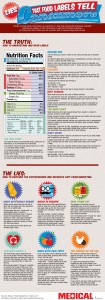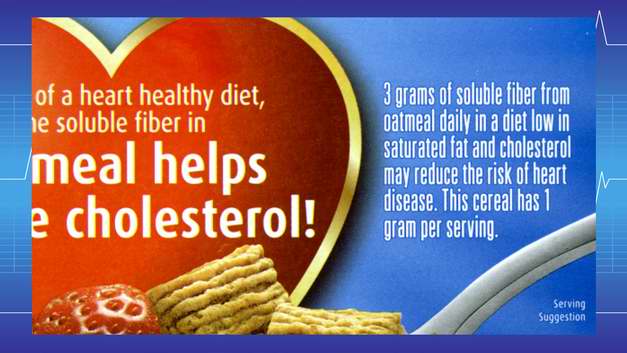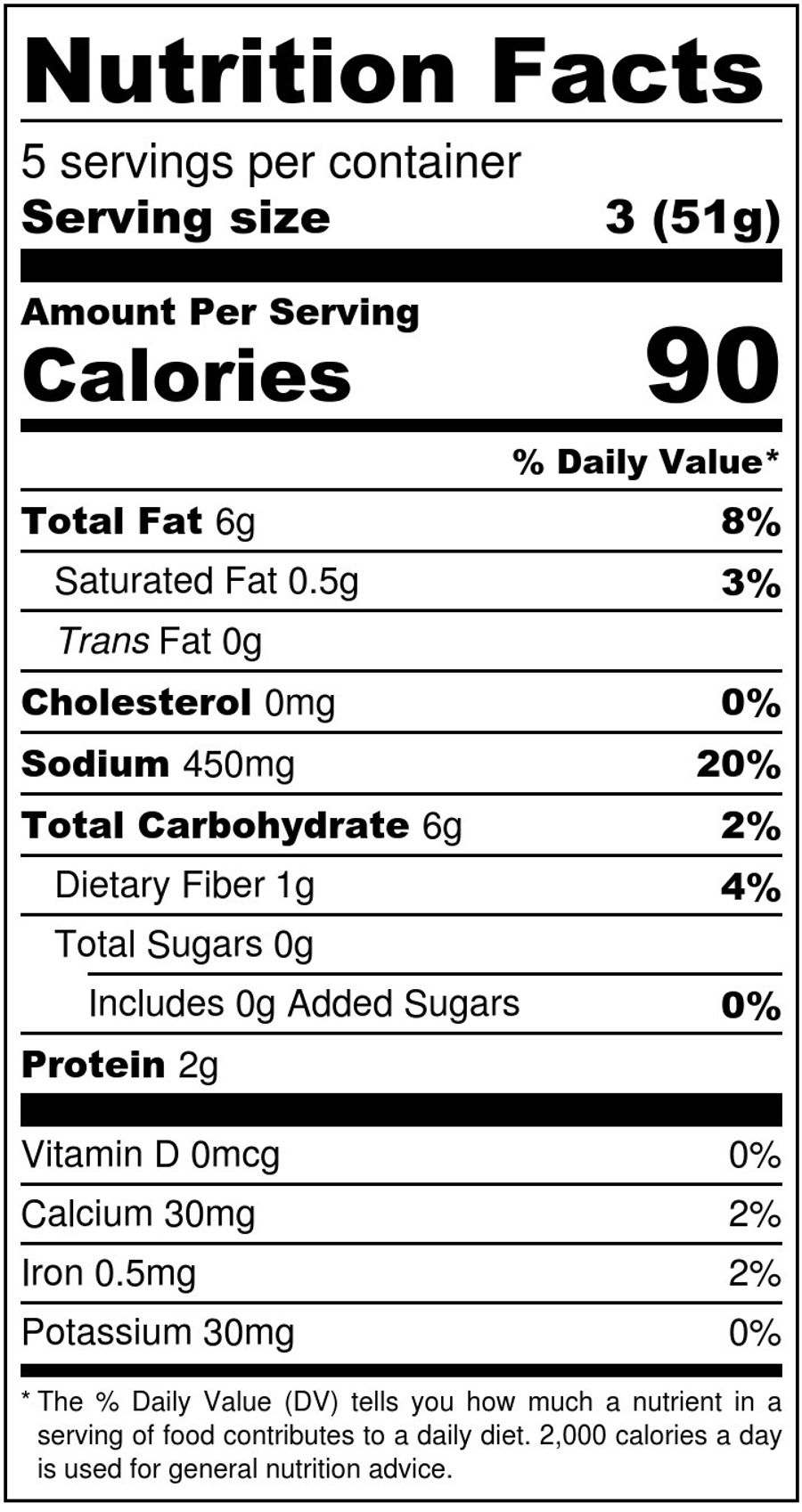39 health claims food labels
Nutrition, health claims and supplement labelling - GOV.UK Nutrition, health claims and supplement labelling Organic food Nutrition, health claims and supplement labelling Nutrition labelling You must follow nutrition labelling information rules... Label Claims for Food & Dietary Supplements | FDA Among the claims that can be used on food and dietary supplement labels are three categories of claims that are defined by statute and/or FDA regulations: health claims, nutrient...
Health and nutrition claims - EU labelling rules May 18, 2022 — a statement indicating the importance of a balanced diet and healthy lifestyle · the quantity of the food and pattern of consumption required to ...

Health claims food labels
In Pictures: 29 Foods With "Health Claims" That ... - Modern Health Monk #6 Chocolate Milk - "Vitamins A&D 37% Less Fat Than Whole Milk!" Ingredients? Okay, so there's actually milk in this. Good sign. Ingredient #2 = sugar. Ingredient #3-6 = cocoa mix science experiment & preservatives. Ingredient # 4 = Artificial flavors. De-lish. #7 Arizona Iced Tea "NO Calories!" At first we're like, "oh, sweet, no calories!?" Nutrition content claims and health claims - Food Standards Health claims are about the relationship between a food and health effects. All health claims must be supported by scientific evidence. Health claims are only permitted on foods that meet the Nutrient Profiling Scoring Criterion (NPSC). For example, the Standard doesn't allow health claims on foods higher in saturated fat, sugar or salt. How to Read Food Labels Without Being Tricked - Healthline In fact, research shows that adding health claims to front labels makes people believe a product is healthier than the same product that doesn't list health claims — thus affecting consumer ...
Health claims food labels. Health claims on food labels - PubMed Health claims on food labels Food and drug law requires that the ingredients in most foods be disclosed on their labels, but until recently there was no requirement that nutrition information be provided. The Nutrition Labeling and Education Act of 1990 (NLEA), passed on November 8, 1990, mandated the Food and Drug Administrati … Don't Be Fooled By These Food Labels - Health If a product has a USDA label that says organic, 95% or more of the ingredients must have been grown or processed without synthetic fertilizers or pesticides (among other standards). A label... Legal Guide to Health Claims on Food | Law@Dayton The Nutrition Labeling and Education Act, which amended the FD&C Act in 1990, requires most foods to be labeled with serving sizes and specific nutrition information, and it sets standards for food labels that make certain health claims. The Fair Packaging and Labeling Act of 1966 spells out packaging requirements for food and other packaged ... How to read food labels | healthdirect Energy: A kilojoule is a measure of energy. To lose weight, you need to eat and drink fewer kilojoules (kJ) than you use. You should limit your intake of discretionary or junk foods — i.e. those that have more than 600kJ per serve.
Health claims on food labels - Food labels - Canadian Food Inspection ... Function claims (definition) relate to the effects that a food has on the normal functions of the body. They are based on the role that the food or the food constituent plays when consumed at levels consistent with normal dietary patterns. Function claims also contain two subcategories of claims: Nutrient Function Claims Probiotic Claims Qualified Health Claims | FDA - U.S. Food and Drug Administration For a QHC petition with credible scientific evidence, the FDA issues a Letter of Enforcement Discretion including specific claim language that reflects the level of supporting scientific evidence... Questions and Answers on Health Claims in Food Labeling Health claims in food labeling are claims that have been reviewed by FDA and are allowed on food products to show that a food or food component may reduce the risk of a disease or a... Food Packaging Claims | American Heart Association It's important to understand what these claims mean so you can make informed decisions about the food you buy for yourself and your family. There are three categories of claims defined by statute and/or FDA regulations that can be used on food and dietary supplement labels: health claims, nutrient content claims, and structure/function claims.
Food Labels (for Teens) - Nemours KidsHealth Some food labels also state which country the food came from, whether the food is organic, and certain health claims. In the United States, the Food and Drug Administration (FDA) and the Department of Agriculture (USDA) also regulate any health claims that companies make on their food labels. When a food says “healthy,” "light" ("lite"), or ... Health Claims on Food Labels Health claims may be statements like: "This food is a good source of calcium. Adequate intake of calcium may reduce the risk of osteoporosis." "Development of cancer depends on many factors. A diet low in total fat may reduce the risk of some cancers." But just because a food label has a health claim does not mean that the food is healthy for ... Health and nutrition claims on food labels - FoodTruths Health claims on packaged foods are classified into general claims and high level health claims. A general claim will relate to the effect on health of a nutrient or ingredient in a product. An example of this type of claim would be saying that a product is a good source of protein which is 'necessary for tissue building and repair'. General health claims - Health claims on food labels - Food labels ... General health claims may not refer to the treatment, prevention or cure of a Schedule A disease; or claim to treat, mitigate, or prevent a disease, disorder or physical state; or claim to correct, restore or modify an organic function [3 (1) and 3 (2), FDA ]. Such claims are considered to be drug claims (see Drugs vs. Foods ).
Nutrient Claims on Food Labels - Clemson University Lean Claims. Lean. Contains less than 10 grams total fat, 4.5 grams or less saturated fat, and less than 95 milligrams cholesterol. Extra lean. Contains less than 5 grams total fat, less than 2 grams saturated fat, and less than 95 milligrams cholesterol. *compared to the reference, or regular, food this would replace.
ISU prof concerned that misperceptions about energy drinks could have health consequences • News ...
Health Claims - Canada.ca The Food Directorate assesses whether health claims are truthful and not misleading by reviewing mandatory and voluntary pre-market submissions. Decisions about health claims which are based on Health Canada reviews are available on this website. Depending on the novelty of the substance that is the subject of the health claim, the food product ...
What You Need to Know About Health Claims on Food Labels and Dietary ... In general, health claims are statements made on food product labels or dietary supplements that boast some type of health benefit. This may seem simple, but the FDA doesn't treat every claim the same way. Label claims come in multiple forms: Health claims (which comprise of authorized health claims and qualified health claims)

Americans pay less attention to 'organic' and 'GMO' in weighing food health benefits, survey ...
Health claims on food labels - Food labels - Canadian Food Inspection ... A health claim is any representation in labelling or advertising that states, suggests, or implies that a relationship exists between the consumption of a food and health. All aspects of food labels and advertisements contribute to the overall impression made by a food product, including health claims. For this reason, health claims are also ...
Understanding Food Labels | The Nutrition Source | Harvard T ... The FDA has approved 12 health claims on food labels such as the relationship between calcium and osteoporosis; sodium and hypertension; fiber-containing grains, fruits and vegetables and cancer; and folic acid and neural tube defects. However, just because a food contains a specific nutrient that is associated with a decreased risk of disease ...
5 Understanding Food Labels and Health Claims - Maricopa Health Claims & Foods To keep companies from making false claims, the FDA provides food manufacturers' regulations in putting labels on packages that promote health. There are three levels of health claims: A health claim is supported by scientific evidence. An example is "reduces heart disease."
Health Claims on Food Labels - LabelCalc A lot of new food manufacturers ask me about making health claims on food labels, so today I wanted to shed some light on what can sometimes be a complex process. In order to successfully navigate the world of claims for your food product—from health claims to nutrient content claims and everything in between—here are the FDA rules you need ...
Nutrition, health and related claims - Food Standards Food businesses wanting to make a general level health claim can base a claim on one of the more than 200 pre-approved food-health relationships in the Standard or self-substantiate a food-health relationship by following the process for systematic review in Schedule 6 of the Code. Self-substantiating a food-health relationship
Nutrient function claims - Health claims on food labels - Food labels ... Table Notes. Table Note 6. The following two general nutrient function claims are permissible for all nutrients [B.01.311, B.01.312, D.01.006, D.02.004, FDR]: "Energy (or Name of the nutrient) is a factor in the maintenance of good health." "Energy (or Name of the nutrient) is a factor in normal growth and development."
Label Claims for Conventional Foods and Dietary Supplements the nutrition labeling and education act of 1990 (nlea) provides for the use in food labeling of health claims that characterize a relationship between a food, a food component, or...
How to understand food labels | Eat For Health A new standard to regulate nutrition content and health claims was gazetted in January 2013 (Standard 1.2.7 – Nutrition, Health and Related Claims). There is a three year transition period which means that by 18 January 2016, foods carrying nutrition content claims, health claims and endorsements will need to comply with the new Standard.
Health Claims on Food Labels - Consumer Reports Health Claims on Food Labels: What's True, What Isn't A guide to what 'natural,' 'multigrain,' 'free-range,' and more really mean By Sally Wadyka January 07, 2019 R eading the information on...
EU Register of nutrition and health claims made on foods (v.3.6) Authorised health claims, their conditions of use and applicable restrictions, if any;; Non-authorised health claims and the reasons for their non-authorisation ...
Health Claims on Food Labels | LegalMatch A health claim involves whether or not some type of food or food component can affect a disease or health-related condition. In other words, a health claim can be a label on a product that says how the food is beneficial in helping to prevent or treat some kind of health condition. For example, your orange juice container may have a health ...
Health Claims on Food Labels Health Claims on Food Labels Topic Overview Food makers can make health claims about certain nutrients, such as calcium, fiber, and fat, that are found naturally in foods. The health claims must be balanced and based on current, reliable scientific studies and must be approved by the U.S. Food and Drug Administration (FDA).












Post a Comment for "39 health claims food labels"